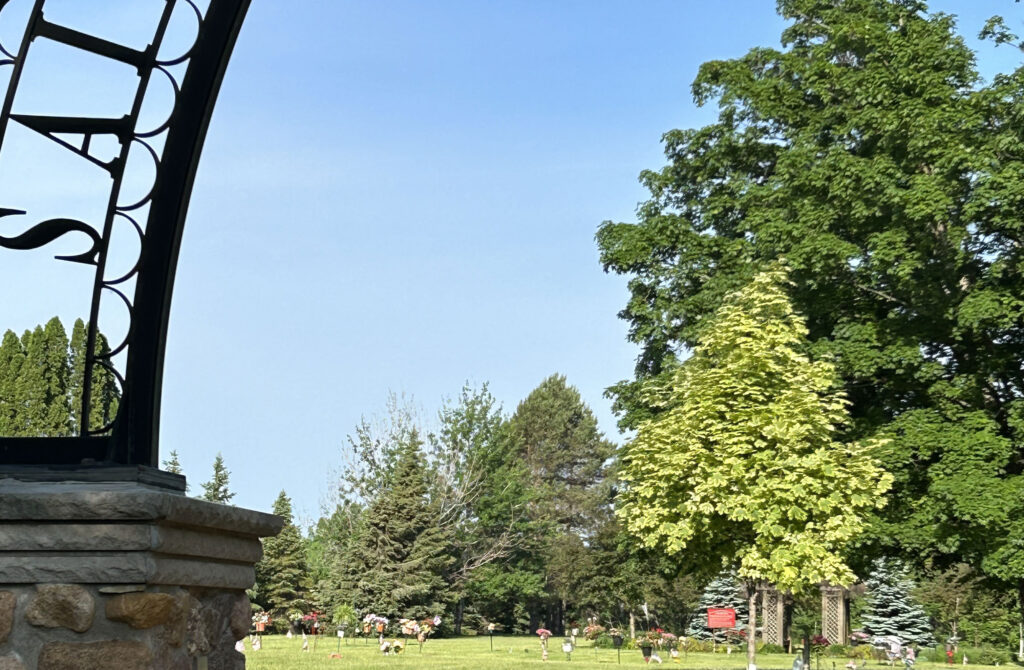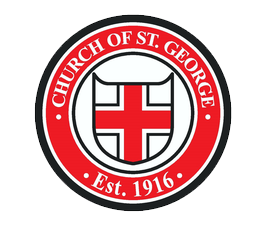
Funeral Rites
Christians celebrate the funeral rites to offer worship, praise, and thanksgiving to God for the gift of a life which has now been returned to God, the author of life and the hope of the just. The Mass, the memorial of Christ’s death and resurrection, is the principal celebration of the Christian funeral. ~ Order of Christian Funerals
The death of a loved one is a difficult time for families. At St. George, our commitment is to assist the family of the deceased in preparing a meaningful celebration of life both on earth and eternal life.
To request the Last Rites
Call the emergency line, 651.402.9005 24 hours a day. The call is referred to a priest or pastoral minister. Arrangements can be made to come to your home, nursing home, or hospital to anoint your loved one. Only a priest can administer the Sacrament of the Sick.
Scheduling a Funeral at St. George
After the death of your loved one, contact the parish office at 952.473.1247 during office hours or contact Father Shane at 651.402.9005 after hours. We will work with you and your funeral director to schedule the funeral, based on the availability of our facilities and clergy. It is our policy that funerals take precedence over most other activities.
The normal time for funerals is weekday mornings Tuesday through Friday at 10:30 am. or 11:00 am. Saturday funerals should be considered a rare exception. No Mass of Christian Burial or Memorial Mass may be scheduled on Sundays, Mondays, certain Feast Days, or during the Paschal Triduum (Holy Thursday evening through Easter Sunday).
Funeral Liturgy Planning
The celebration of a Christian funeral brings hope and consolation to those that are grieving. Families first meet with Father Shane to plan an individualized funeral liturgy and may then meet with Nuriel to plan the music.
Here are some of the choices you’ll be invited to make for your loved one’s Funeral Liturgy:
The Word of God
In every celebration for the dead, the Church attaches great importance to the reading of the Word of God. The readings proclaim to the assembly the paschal mystery, teach remembrance of the dead, convey the hope of being gathered together again in God’s Kingdom, and encourage the witness of Christian life.
Suggested Funeral Readings
The following are lists of Scriptures appropriate for use at Catholic Funeral Liturgies. One reading is chosen from each: the Old Testament, the New Testament, and the Gospels – except during Eastertide, when the first reading is also chosen from the New Testament.
First Reading (outside Eastertide): Old Testament
2 Maccabees 12:43-46 “…he made atonement for the dead…”
Job 19: 1, 23-27 “…I know that my vindicator lives….”
Ecclesiastes 3:1-15 “…A time to be born, a time to die…”
Wisdom 3:1-9 “…The souls of the just are in the hand of God…”
Wisdom 4:7-14 “The Righteous One, though he die early, shall be at rest…”
Isaiah 25:6a, 7-9 “…he will destroy death forever…”
Lamentations 3:17-26 “…My portion is the Lord, says my soul…”
Daniel 12:1-3 “…the wise shall shine brightly…”
First Reading (inside Eastertide): New Testament
Acts of the Apostles 10:34-43 “Everyone who believes in him will receive forgiveness of sins”
Revelation 14:13 “…Blessed are the dead who die in the Lord…”
Revelation 20:11-12:1 “…The sea gave up its dead; then Death and Hades…”
Revelation 21:1-5a,6b-7 “…I also saw the holy city, a new Jerusalem…”
Second Reading: New Testament
Romans 5:1,5-11 “…We were reconciled to God through the death of his Son…”
Romans 5:17-21 “…through one righteous act acquittal and life came to all…”
Romans 6:3-9 “…if we have died with Christ, we believe that we shall live with him…”
Romans 8:14-23 “Those who are led by the Spirit of God are Children of God”
Romans 8:31-35,37-39 “If God is for us, who can be against us?”
Romans 14:7-9,10-12 “This is why Christ died and came to life”
1 Corinthians 15:20-28 “In Adam all die, so too if Christ shall all be brought to life.
1 Corinthians 15:51-57 “Death where is your victory?”
2 Corinthians 4:14-5:1 “The one who raised the Lord Jesus will raise us…”
2 Corinthians 5:1,6-10 “We would rather leave the body and go home…”
Philippians 3:20-21 “He will change our lowly body…”
1 Thessalonians 4:13-18 “If we believe that Jesus died and rose…”
2 Timothy 2:8-13 “Remember Jesus Christ, raised from the dead…”
1 John 3:1-2 “Beloved, we are God’s children now…”
1 John 3:14-16 “We know that we have passed from death to life…”
Gospel
Matthew 5:1-12a “The Eight Beatitudes”
Matthew 11:25-30 “Come to me . . . and I will give you rest.”
Matthew 25:1-13 “Look. The bridegroom comes. Go out to meet him”
Matthew 25:31-46 “Come, you whom my Father has blessed”
Mark 15:33 –16:6 “Jesus gave a loud cry and breathed his last”
Luke 7:11-17 “Young man, I say to you, arise.”
Luke 12:35-40 “Be prepared, for at an hour you do not expect,…”
Luke 23:33, 39-43 “Today you will be with me in paradise.”
Luke 23:44–24:6a “Father, I put my life in your hands.”
Luke 24:13-35 “Was it not necessary that the Christ should suffer…”
John 5:24-29 “Whoever hears my word and believes has passed from…”
John 6:37-40 “All who believe in the Son will have eternal life…”
John 6:51-58 “All who eat this bread will live forever….”
John 11:17-27 “I am the resurrection and the life.”
John 11:32-45 “Lazarus, come out.”
John 12:23-28 “If a grain of wheat falls on the ground and dies…”
John 14:1-6 “There are many rooms in my Father’s house.”
John 17:24-26 “Father, I want those you have given me to be with me…”
John 19:17-18, 25-39 “And bowing his head he handed over his Spirit.”
Music
Music is integral to the funeral rites. The music at funerals should support, console and uplift the participants and should help to create in them a spirit of hope in Christ’s victory over death and in the Christian’s share in that victory.
We encourage families to select the music for the funeral liturgy with the assistance of Nuriel Abdenur, Director of Music and Liturgy. Music selections for the funeral Mass should be suitable to the sacred nature of the funeral service.
St. George musicians will provide music for all funerals. If a family requests, additional soloists or instrumentalists may be added with permission from Nuriel.
Liturgical Roles
We encourage family members or friends to fill these roles:
Readers (Old Testament, New Testament, Prayers of the Faithful)
We suggest choosing someone who is familiar with the Catholic Mass who can proclaim clearly and is comfortable in front of large groups of people. Be sure to give them a copy of the reading in advance. On arrival, Nuriel, Fr. Shane, or the Altar Server will acquaint the readers with the use of our microphones.
Gift Bearers
Two or more people carry the bread and wine.
Eucharistic Ministers
If the family includes someone who has previously trained and served as a Eucharistic Minister at their parish, they may do so for the funeral Mass. Be sure to notify Father Shane or Nuriel.
Before and After the Funeral Liturgy
Visitation at St. George
The most commonly chosen schedule for visitation includes two to three hours at the funeral home or church on the evening before the funeral liturgy, which may include a Vigil Service if desired. St. George typically offers one hour of gathering/visitation for the public, prior to the funeral Mass. The family is welcome to arrive half an hour before the public.
Remembrance
Words of Remembrance may be given before the Mass begins, with a suggested 3-5 minute maximum. If additional eulogizing is desired, we suggest this be done either at the wake service at the funeral home, or during the funeral luncheon.
Burial
Whether burial involves the full body or cremated remains, with reverence we gather together and through the prayers of the Rite of Committal, commit our loved ones’ remains to a permanent and final resting place. For the rest of their lives, surviving relatives have a specific place to come and grieve, to give honor and to remember. This is an important benefit that burial in a cemetery provides.
Cremated remains are to be treated as we would treat the body. They are to be sealed in a dignified container and buried in the ground in a cemetery or placed in a mausoleum or columbarium. The Church recommends that the place of burial be permanently memorialized with a memorial stone, marking the name and dates of birth and death of the deceased person.
The Church of St. George has a parish Cemetery located in Long Lake at 401 Willow Drive. If you are not familiar with the cemetery, we encourage you to drive through it. For information on St. George’s Cemetery please see the web page about it, or contact the parish office at 952.473.1247 or info@stgeorgelonglake.org.
Rite of Committal
Burial is scheduled according to the requirements of the cemetery chosen by the family. The preferred time for burial is following the funeral liturgy or the luncheon, in which case a priest will accompany the family to the cemetery for the Rite of Committal. This rite does not require a priest and may also be done by a deacon or layperson. If burial is delayed (i.e. due to cremation following the funeral), please contact the parish for pastoral presence when the burial is scheduled.
Commonly Asked Questions about Funerals
What is the difference between a Mass of Christian Burial and a Memorial Mass?
A Mass of Christian Burial takes place with the remains of the deceased person present.
A Memorial Mass/Service is held in memory of the deceased person, but no remains are present.
What does the Catholic Church say about cremation?
Cremation is accepted by the Roman Catholic Church. It is preferred that the body of the deceased be present at the funeral liturgy and cremation take place afterward, but it is also acceptable for the cremation to take place first and the cremains to be present at the funeral liturgy. The Catholic Church requires that the cremains be buried, or interred, as a whole following the funeral, just as a body would be interred.
Blessed are they who mourn, for they will be comforted. Matthew 5:4
The Remembrance Service
When someone we know and care for dies, there are many emotions we feel; sorrow, depression, hurt, abandonment – even anger and joy. One of the most important things we can do is to be with others who have experienced a similar loss, and know that we are not alone.
Each year, the church will schedule a date/time for our remembrance service. Check the events calendar.

